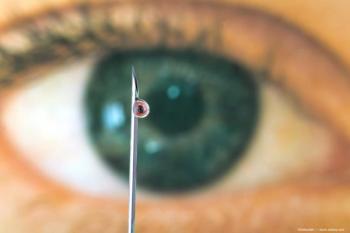
Novel treatment options for IOP involve range of independent factors
When exploring novel treatment options for the management of IOP, clinicians should consider a number of independent factors ranging from beneficial behaviors to body position.
Reviewed by Cynthia Mattox, MD, FACS
Educating patients about potential lifestyle changes can be an important adjunct to the medication(s) that clinicians prescribe when it comes to managing glaucoma, said Cynthia Mattox, MD, FACS.
Patients ask about lifestyle all the time, said Dr. Mattox, who is director, Glaucoma and Cataract Service, and vice chairman, clinical services for New England Eye Center, Boston, as well as associate professor of ophthalmology, Tufts University School of Medicine, Boston.
There is evidence supporting what may be beneficial, what may be harmful, and what may not make a difference.
For example, consuming dark-green leafy vegetables can reduce glaucoma risk by 30%, and may be even more helpful in those patients who are prone to having paracentral visual field loss.1
A high beta-carotene intake, as well as other sources of retinol equivalents, was shown in the Rotterdam study2,3
to be associated with “a two-fold decreased incidence of incident glaucoma,” she said.
Conversely, calcium and iron supplementation “may be harmful to our patients, especially in patients who don't have a deficiency,” she added, with similar findings for magnesium.4 The role of antioxidants in food is less clear cut, but Dr. Mattox recommends advocating moderation.
Beneficial behaviors
Regular aerobic exercise is good in general, and may have a moderating effect on IOP levels. However, it is not uncommon to find a slight IOP rise in previously active patients who are newly sedentary (for example, from an injury), according to Dr. Mattox.
“It’s advisable for our glaucoma patients to avoid prolonged Valsalva maneuvers,” she said.
Clinicians should advise patients to avoid being upside down for long periods to minimize choroidal expansion.
There is some suggestion that in certain patients with certain phenotypes and a paracentral visual defect, that low body mass index may play a role.
“A lot of our patients take herbal supplements,” Dr. Mattox said. “The rationale for some supplements is that they may protect retinal ganglion cells from toxicity or apoptosis.”
They may also reduce caspase 3 and 9, and inhibit gene expression. Some supplements have been reported to reduce IOP in animal models, “but the evidence is soft,” she said.
There is little evidence about the benefits of acupuncture, but the rationale for its incorporation into patients’ lifestyle is that acupuncture stimulates the release of neurochemicals. One study did not find any pressure effect on IOP from patients undergoing acupuncture, nor were the researchers able to study if acupuncture can protect the optic nerve, Dr. Mattox noted.
Systemic factors
Systemic hypotension, especially nocturnal, could be particularly harmful for patients, she said.
Patients with glaucoma should be careful not to be “overtreated with their blood pressure medication,” she said, and recommended that patients avoid nighttime dosing with anti-hypertensive medications.
Body position during sleep may have an effect on IOP as well, Dr. Mattox said, with the dependent eye having a higher IOP and studies showing a habitual side more prone to worsening optic nerve damage, especially if a patient has a higher IOP.
Sleeping with a wedge pillow may help mitigate supine IOP elevations, “which can be helpful if our patients do have an autoregulatory problem while they’re sleeping in a supine position,” she said.
Caution patients not to flex or extend their necks as IOP can be aggravated. For side-sleeping patients, recommend that they alternate sides when possible to minimize the pressure on the pillow-facing side, she added.
Finally, retinal ganglion cells are known to express estrogen receptors, and “there does appear to be some increased risk in patients who have an early onset menopause or have prolonged oral contraceptive use,” she said.
Some studies have looked at reduced risk of developing glaucoma in patients who have postmenopausal estrogen hormone replacement therapy.5 In one study-using data from a large, nationwide healthcare claims database with medical records for more than 150,000 women-estrogen hormone therapy “may reduce the risk of primary open-angle glaucoma.”5
Dr. Mattox said this is an active area of research that may help us understand the mechanisms of glaucoma.
References
1. Kang JH, Willett WC, Rosner BA, Buys E, Wiggs JL, Pasquale LR. Association of dietary nitrate intake with primary open-angle glaucoma: A prospective analysis from the nurses’ health study and health professionals follow-up study. JAMA Ophthalmol. 2016;134:294-303.
2. Ramdas WD, Wolfs RCW, Kiefte-de Jong JC, et al. Nutrient intake and risk of open-angle glaucoma: the Rotterdam Study. Eur J Epidemiol. 2012;27:385-393. doi:10.1007/s10654-012-9672-z.
3. Hofman A, van Duijn CM, Franco OH, et al. The Rotterdam Study: 2012 objectives and design update. Eur J Epidemiol. 2011;26:657-686. doi:10.1007/s10654-011-9610-5.
4. Wang SY, Singh K, Lin SC. Glaucoma prevalence and the intake of iron and calcium in a population-based study. Curr Eye Res. 2013;38:1049-56.
5. Newman-Casey PA, Talwar N, Nan B, Musch DC, Pasquale LR, Stein JD. The potential association between postmenopausal hormone use and primary open-angle glaucoma. JAMA Ophthalmology. 2014;132:298-303.
Cynthia Mattox, MD, FACS
This article was adapted from Dr. Mattox’s presentation during Glaucoma Subspecialty Day at the 2016 meeting of the American Academy of Ophthalmology. Dr. Mattox is a consultant to and/or has received lecture fees or grant support from Aerie Pharmaceuticals, Alcon Laboratories, Alimera Sciences, Allergan, the National Eye Institute, Ocular Therapeutix, and Transcend Medical.
Newsletter
Don’t miss out—get Ophthalmology Times updates on the latest clinical advancements and expert interviews, straight to your inbox.





























